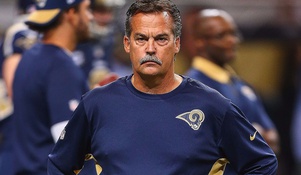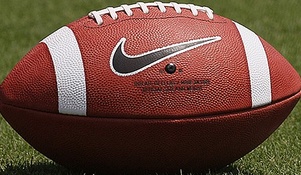The College Football Playoff Beef
We knew it would end this way, but we still bit hook, line, and sinker. At the end of the 2016 season there were always going to be more than four teams with a legitimate argument for entry into the College Football Playoff. The contention could be made that almost every year you will have more than just four individual teams with a record and a resume making them eligible for a chance at College Football's most prestigious trophy. No one can convince me that Penn State did not have the resume. No one can convince me that Michigan did not have the talent.
It's tough, though. With the current four-team playoff in place, even if all four are conference champions, someone in the Power 5 conferences is being left out of the mulah...oops! I meant to say not able to represent their school proudly as hard-working student-athletes. Inasmuch, with their only being four spots, the NCAA obviously does not value conference championships the way that most of the public might see the same championship. So how much do conference championships actually factor into the committee's argument for a team to find their way into the playoff? Apparently, not much. We were reminded this week that the committee uses conference championships as a somewhat tie-breaker between two close teams, but is this really true? Ohio State, who will finish at best 3rd in the Big 10, did not win their conference nor their division and the Buckeyes were beaten by the eventual winners of their Big 10 division and the conference overall (Penn State).

The committee's argument? Ohio State is just so much better than everyone else in the country that they have "separated themselves" from the rest of the pack, much like Alabama.
...Huh?
In my estimation, the only team that has separated itself from the rest of the field is Alabama. Alabama, the only Power 5 conference team to run the table in the regular season and win their conference championship is the only squad that is heads-and-shoulders above everyone else. Period. If you have a loss on your resume, even just one, you are not invincible and therefore should be subject to the same criteria as every other team.

Let me put this another way. If Ohio State and Penn State swapped jerseys and Penn State finished the year (8-1, 11-1) and did not reach the Big 10 Championship game (let alone win the damn thing) and on the other side, Ohio State came out of 2016 at (8-1, 11-2) with a win over that same Penn State team and won the Big 10 Championship game...you're telling me the committee would have made the same decision? I'm not buying.
Ohio State is a huge brand name in college football. It stacks up there with the Trojans of Southern Cal, the Longhorns of Texas, the Hurricanes of Miami, and the Crimson Tide of Alabama. The Buckeyes boast several NFL Draft selections every year and have legitimately been a team that reloads instead of rebuilds every season especially since the arrival of head coach Urban Meyer. This is not to say that Penn State is not a brand name in college football, but its brand has been tainted badly in the last decade and thus is not close to the same level of some of the aforementioned teams. Penn State does not have the benefit of the doubt like Ohio State.
The Nittany Lions lost to one of the best 8-4 teams ever in college football (Pitt - remember their win against #2 Clemson, too?) by three away from Happy Valley. Their only other loss came in the Big House to a Michigan team that is a hot-bed of NFL talent. By the way, Michigan ends the season ranked 6th, just behind Penn State.
Let's not leave the Wolverines out of this, either. They do have the double-overtime loss to Ohio State and two weeks prior had the bad one-point loss at Iowa. Michigan's biggest sin was losing at the wrong time. If Michigan had the same loss to the same Iowa team in week two or three of the season we might be talking about a whole other scenario entirely. The committee could easily look at the Wolverines 1-2 record to end the season and say this team is not one of the four best teams in the country. I'd love to call it a cop-out, but a big part of me believes ending the year well and having momentum going into bowl season should play a part in this whole hoopla. No team is the same now as they were 12 weeks ago when the season began. Is Michigan's team one of the top most talented teams in all of college football? I believe the answer to that question is undoubtedly, yes.
So if the committee's creed is to anoint the four best teams in college football, how can you leave this Michigan team out of the mix?

My point in all of these rhetorical questions are not to obtain answers (because I'm not sure the answers exist) or even to cry "re-do" now that the smoke has cleared. Rather it is to say that the college football selection committee's criteria is ill-defined. Worse than that, it appears to be inconsistent.
Baylor was booted out of a chance to participate in the playoff two years ago because the committee felt their non-conference schedule was entirely too weak. "The Bears have not been battle-tested", they said. However, this past Sunday, a Washington Huskies team, with a 127th ranked non-conference schedule (there are only 128 FBS teams), is ushered into the playoff at the four-spot to take on Alabama in the Peach Bowl. So the non-conference schedule is enough to keep some teams out of the playoff, but not others? The Huskies did win the Pac-12 Championship against Colorado on Friday night, but then if we are counting that much on conference championship games then the Penn State argument surfaces again. And around, and around we go.
Is there a correct answer as to who are the four best teams in college football? No, of course not. Most college football teams play around 10 or 11 games. That's only 8 or 9 percent of the entire field of FBS contenders. At the end of the day it's a guess; the committee's best estimate on who is "the most deserving."
"Most deserving" the four teams of Alabama, Clemson, Ohio State, and Washington might be, but at the end of the day what the NCAA really cares about is television ratings. That is where all of the money lies in college football (pun intended). Clemson and Ohio State we figured would be #2 and #3 in some fashion because of past rankings, but the big question for the committee to decide on Saturday night was who to place in the four-spot to take on the all-mighty Crimson Tide in the first playoff game. Which team out of Washington, Penn State and Michigan would you rather see take on Alabama? Which of those three teams will give Alabama the best run for their money? Which is really the most prepared to go head-to-head with a team that has already separated itself from the rest of the field?
If the committee had asked themselves those questions, we might have a different "Final Four".





